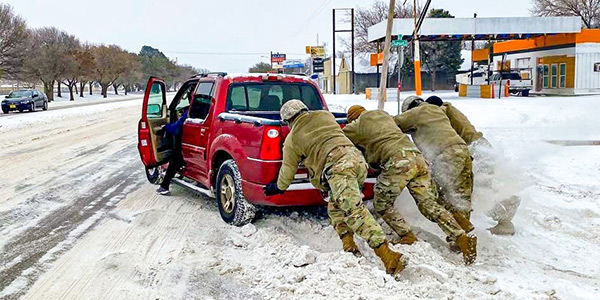NERC is considering accelerating the schedule for its cold weather standard project (Project 2019-06) after last month’s winter storm that led to prolonged mass outages in Texas lent a fresh urgency to the effort, project leaders told the standard drafting team (SDT) in a conference call Monday.
NERC Senior Standards Developer Jordan Mallory told participants that the team will seek permission from the Standards Committee to shorten the next formal comment and ballot period, scheduled to begin April 2, to 25 days from the standard 45. That will enable members to respond to comments and move to final ballot by May 14; if it is approved by stakeholders, the proposal will be submitted to NERC’s Board of Trustees when it meets on June 11.
The update may represent a shift in NERC’s thinking following February’s winter storm. In the immediate aftermath of the crisis, representatives said the organization was “not accelerating, but increasing [the] urgency” of the standard development effort and said the joint ERCOT: Grid was ‘Seconds and Minutes’ from Total Collapse.)
In a webinar the same month, the team for Project 2019-06 said that the joint inquiry had not affected the schedule for its effort and that it expected development to wrap “by the end of the year.” (See Cold Weather Standards Team Sticking to Year-end Target.)
SPP’s Matthew Harward, chair of the SDT, said that the board “has requested the acceleration of the timeline.” However, in a follow-up conversation via email with ERO Insider, a NERC representative emphasized that “no action [has been] taken at this time” and that staff will work with the Standards Committee “to determine the timeline regarding the cold weather standards.”
Leaders See Positive Momentum
Harward acknowledged during Monday’s call that the revised schedule would require more intense work. He reminded members that “a lot has happened” during the most recent formal comment and ballot, which began on Jan. 27 and closed on Friday.
The ballot asked stakeholders for their approval of three updated standards: EOP-011-2 (Emergency preparedness), IRO-010-4 (Reliability coordinator data specification and collection) and TOP-003-5 (Operational reliability data). Proposed changes to the standards, respectively, included:
- new requirements for cold weather preparedness plans on the part of generator owners, along with data specifications and collections for balancing authorities and annual maintenance and inspection requirements;
- data specification requirements for reliability coordinators; and
- data specification requirements for transmission operators.
None of the three standards met the two-thirds segmented-weighted threshold required for approval; IRO-010-4 came closest with 66.22%, while TOP-003-5 received 64.35% and EOP-011-2 had 49.39%. SDT leaders were nonetheless positive about the results, with Mallory observing that first ballots for standard projects “[are] usually a lot lower” and thanking team members for their outreach to industry after February’s webinar.
Over the next 11 days, the team will work through stakeholders’ questions and objections, particularly for EOP-011-2; a common concern expressed in comments was whether this standard, which addresses operational considerations, was a good fit for requirements relating to cold weather preparedness.
More Standards Actions Possible
Some stakeholders, particularly in areas where cold weather is commonplace, remain unconvinced that new, binding standards are needed at all — a theme in all of the previous comment periods for the project. (See Gen Operators Cool to Winter Preparedness Standard.) However, other respondents — notably Brandon Gleason of ERCOT — urged NERC to be even bolder in light of the recent emergency.
“ERCOT supports the proposed requirement to mandate weatherization plans as an important first step in ensuring reliability. However, an effective reliability standard would need to include clear and enforceable metrics, which the plan must be designed to achieve,” Gleason said. “It is apparent based on the February 2021 extreme cold weather event that having a plan may not be sufficient by itself to ensure reliability. ERCOT would support a subsequent reliability standard project in order to specify these clear and enforceable metrics.”
Harward echoed Gleason’s comment when he noted that last month’s storm “may result in additional requirements or standards development work.” But he reminded attendees that their mandate was to address only the recommendations of FERC and NERC’s joint report on the Jan. 17, 2018, cold-weather event in the South Central U.S. and warned against the temptation to overreach. (See NERC Panel Delays Action on Cold Weather Prep.)
“[Our] proposed standards may only be a first step in the evolution of cold weather preparedness for the industry, but it is a first step that we must take, and it is necessary and vital that we do this work,” Harward said. “I just ask you to be diligent so that we don’t let the scope creep or wander too far down rabbit holes, and … stay focused on the job ahead of us.”





